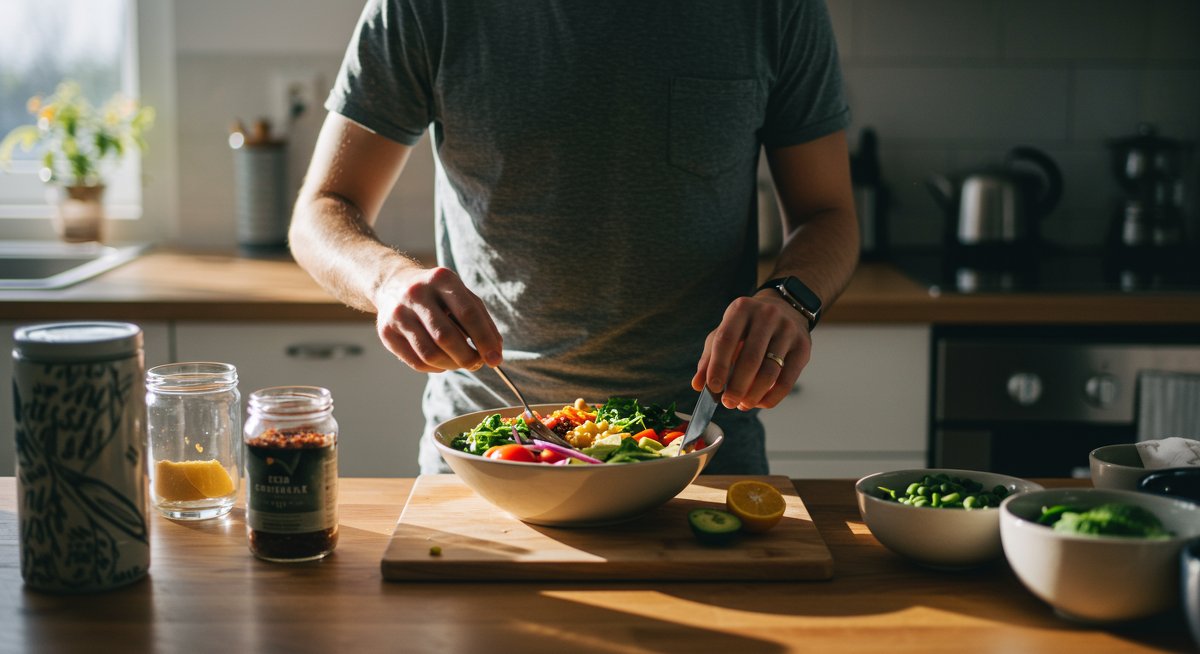Why This Reddit Post Hit Home
I was scrolling through r/loseit the other day, and a post immediately jumped out at me. Someone was talking about their struggles with evening snacking, and it felt so relatable. They were nailing their calorie targets all day, but once evening rolled around, the snack floodgates would open. Sound familiar?
It's that "one little snack won't hurt" mentality that derails so many of us. And it's often tied to comfort, relaxation, and even family traditions, making it even harder to break. But here's the thing: those extra 300-500 calories every night add up, and they can completely stall your progress. I’ve seen this happen with so many people trying to lose weight. The secret to success is in understanding the triggers that cause you to give in, and planning ahead to resist them.

The Vicious Cycle of Evening Indulgence
So, what's really going on here? This isn't just about willpower. There's a whole cascade of factors at play that contribute to this evening snacking phenomenon.
First, think about your day. You're probably busy, focused, and maybe even a little stressed. You're actively making choices to stay on track with your diet. But by evening, your willpower is often depleted. You're tired, you want to relax, and your brain is looking for a reward. That's where snacking comes in. It provides a quick hit of dopamine, that feel-good neurotransmitter, making you feel momentarily better. The problem is that this feeling is very short lived and followed by the potential guilt of breaking your diet.
Then there's the association with evening activities. For many, like the Redditor mentioned, snacking is linked to watching TV, spending time with family, or simply unwinding after a long day. These activities become cues that trigger the desire to snack, even if you're not actually hungry. Also, boredom plays a huge role. Many people snack simply because they don’t have anything else to do with their hands or mouths. This is why finding alternative evening activities is key.
What This Means for Your Weight Loss Goals
Okay, so we've identified the problem. Now, what does this mean for you and your weight loss goals? Well, if you're consistently overeating in the evenings, it's going to be incredibly difficult to reach your targets. Those extra calories can easily negate all the hard work you're putting in during the day.
But it's not just about the calories. Evening snacking can also disrupt your sleep, which in turn can mess with your hormones and increase cravings. Lack of sleep can increase levels of ghrelin, which stimulates appetite, and decrease levels of leptin, which signals fullness. This hormonal imbalance can make you feel hungrier throughout the day, making it even harder to resist those evening snacks. If you’re serious about weight loss, getting seven to eight hours of sleep each night is essential.
More importantly, constantly giving in to those evening cravings can create a negative feedback loop. You feel guilty, you beat yourself up, and then you turn to more snacking to cope with those feelings. It becomes a cycle of self-sabotage. To break free, you need to address both the physical and emotional aspects of evening snacking.
The Unspoken Challenges of Breaking the Habit
Let's be real. Kicking this habit isn't going to be easy. As the Redditor pointed out, it's often deeply ingrained and tied to emotional connections. You're not just fighting a physical craving; you're also fighting a psychological one. There's also the social aspect. If your family or partner is used to snacking in the evenings, it can be tough to resist when they're indulging. You might feel like you're missing out or disrupting the routine. In my experience, social pressure is one of the biggest hurdles to overcome.
Another challenge is the feeling of deprivation. When you tell yourself you can't have something, it often makes you want it even more. This is why restriction can backfire. Instead of completely cutting out snacks, you might need to find healthier alternatives or strategies to manage your cravings. Trying to find healthy swaps is the first step in conquering this hurdle.
And let's not forget the mental game. Your brain will try to convince you that "one little snack won't hurt." It'll rationalize, it'll bargain, and it'll do everything it can to get you to give in. You need to be prepared for these mental battles and have strategies in place to combat them. One thing that helps is to remind yourself of your goals and why you want to break this habit in the first place.
Adapting This to Fit Your Lifestyle
So, how can you make this work for your life? The key is to find strategies that are sustainable and that fit your individual needs and preferences.
If you're someone who gets bored easily in the evenings, find alternative activities to keep yourself occupied. This could be anything from reading a book to taking a bath to working on a hobby. The goal is to shift your focus away from food and onto something more engaging.
If you're short on time, meal prep can be a lifesaver. Having healthy snacks readily available can prevent you from reaching for unhealthy options when cravings strike. This doesn’t have to be complicated; simple things like cut-up vegetables, fruits, or yogurt can make a big difference. The trick is to make it as easy as possible to grab a healthy choice.
If you're struggling with emotional eating, try to identify the emotions that trigger your snacking. Are you stressed, bored, or lonely? Once you know your triggers, you can find healthier ways to cope with those emotions. This might involve talking to a therapist, practicing mindfulness, or engaging in activities that bring you joy. Self-awareness is key to breaking the emotional eating cycle.

Practical Steps to Ditch the Evening Snack
Okay, let's get down to the nitty-gritty. How do you actually put this into practice? Here's a step-by-step guide to help you kick that evening snacking habit:
Track Your Snacks: For a week, keep a detailed record of everything you eat in the evenings, including the time, the food, and the emotions you were feeling. This will help you identify patterns and triggers.
Plan Your Evening Snack: If you know you're going to want a snack, plan for it in advance. Choose a healthy option and portion it out. This will prevent you from mindlessly eating whatever's in sight.
Create a Snack-Free Zone: Designate a specific area in your house, like the living room, as a snack-free zone. This will help break the association between that space and eating.
Find a Distraction: When a craving hits, find something to distract yourself. This could be anything from going for a walk to calling a friend to doing a puzzle.
Brush Your Teeth: This might sound silly, but brushing your teeth can actually help curb cravings. The minty flavor can make food less appealing.
Hydrate: Sometimes, we mistake thirst for hunger. Drink a glass of water or herbal tea when you feel a craving coming on.
Get Support: Talk to your family, friends, or a therapist about your struggles. Having a support system can make a huge difference.
My Final Thoughts on the Evening Snack Battle
Here's my take on all of this: Evening snacking is a common struggle, but it's not an insurmountable one. It's about understanding why you're doing it, identifying your triggers, and finding strategies that work for you. It's not about perfection; it's about progress. Don't beat yourself up if you slip up. Just learn from it and keep moving forward.
And remember, you're not alone. Many people struggle with this, and there are resources available to help. Whether it's a supportive community like r/loseit or a professional therapist, don't be afraid to reach out for help. You've got this!